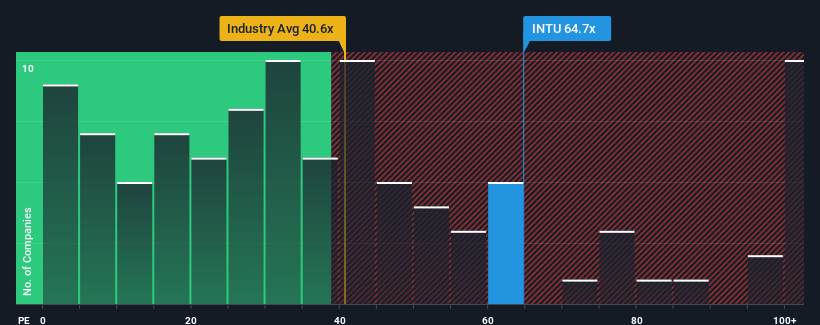- United States
- /
- Software
- /
- NasdaqGS:INTU
Why Investors Shouldn't Be Surprised By Intuit Inc.'s (NASDAQ:INTU) P/E
When close to half the companies in the United States have price-to-earnings ratios (or "P/E's") below 19x, you may consider Intuit Inc. (NASDAQ:INTU) as a stock to avoid entirely with its 64.7x P/E ratio. However, the P/E might be quite high for a reason and it requires further investigation to determine if it's justified.
With earnings growth that's superior to most other companies of late, Intuit has been doing relatively well. The P/E is probably high because investors think this strong earnings performance will continue. If not, then existing shareholders might be a little nervous about the viability of the share price.
Check out our latest analysis for Intuit

Does Growth Match The High P/E?
There's an inherent assumption that a company should far outperform the market for P/E ratios like Intuit's to be considered reasonable.
Retrospectively, the last year delivered an exceptional 25% gain to the company's bottom line. Pleasingly, EPS has also lifted 38% in aggregate from three years ago, thanks to the last 12 months of growth. Therefore, it's fair to say the earnings growth recently has been superb for the company.
Shifting to the future, estimates from the analysts covering the company suggest earnings should grow by 19% per annum over the next three years. With the market only predicted to deliver 10% per year, the company is positioned for a stronger earnings result.
In light of this, it's understandable that Intuit's P/E sits above the majority of other companies. Apparently shareholders aren't keen to offload something that is potentially eyeing a more prosperous future.
What We Can Learn From Intuit's P/E?
We'd say the price-to-earnings ratio's power isn't primarily as a valuation instrument but rather to gauge current investor sentiment and future expectations.
We've established that Intuit maintains its high P/E on the strength of its forecast growth being higher than the wider market, as expected. At this stage investors feel the potential for a deterioration in earnings isn't great enough to justify a lower P/E ratio. Unless these conditions change, they will continue to provide strong support to the share price.
It's always necessary to consider the ever-present spectre of investment risk. We've identified 1 warning sign with Intuit, and understanding should be part of your investment process.
Of course, you might also be able to find a better stock than Intuit. So you may wish to see this free collection of other companies that have reasonable P/E ratios and have grown earnings strongly.
New: AI Stock Screener & Alerts
Our new AI Stock Screener scans the market every day to uncover opportunities.
• Dividend Powerhouses (3%+ Yield)
• Undervalued Small Caps with Insider Buying
• High growth Tech and AI Companies
Or build your own from over 50 metrics.
Have feedback on this article? Concerned about the content? Get in touch with us directly. Alternatively, email editorial-team (at) simplywallst.com.
This article by Simply Wall St is general in nature. We provide commentary based on historical data and analyst forecasts only using an unbiased methodology and our articles are not intended to be financial advice. It does not constitute a recommendation to buy or sell any stock, and does not take account of your objectives, or your financial situation. We aim to bring you long-term focused analysis driven by fundamental data. Note that our analysis may not factor in the latest price-sensitive company announcements or qualitative material. Simply Wall St has no position in any stocks mentioned.
About NasdaqGS:INTU
Intuit
Provides financial management, payments and capital, compliance, and marketing products and services in the United States.
Flawless balance sheet with solid track record and pays a dividend.
Similar Companies
Market Insights
Community Narratives



